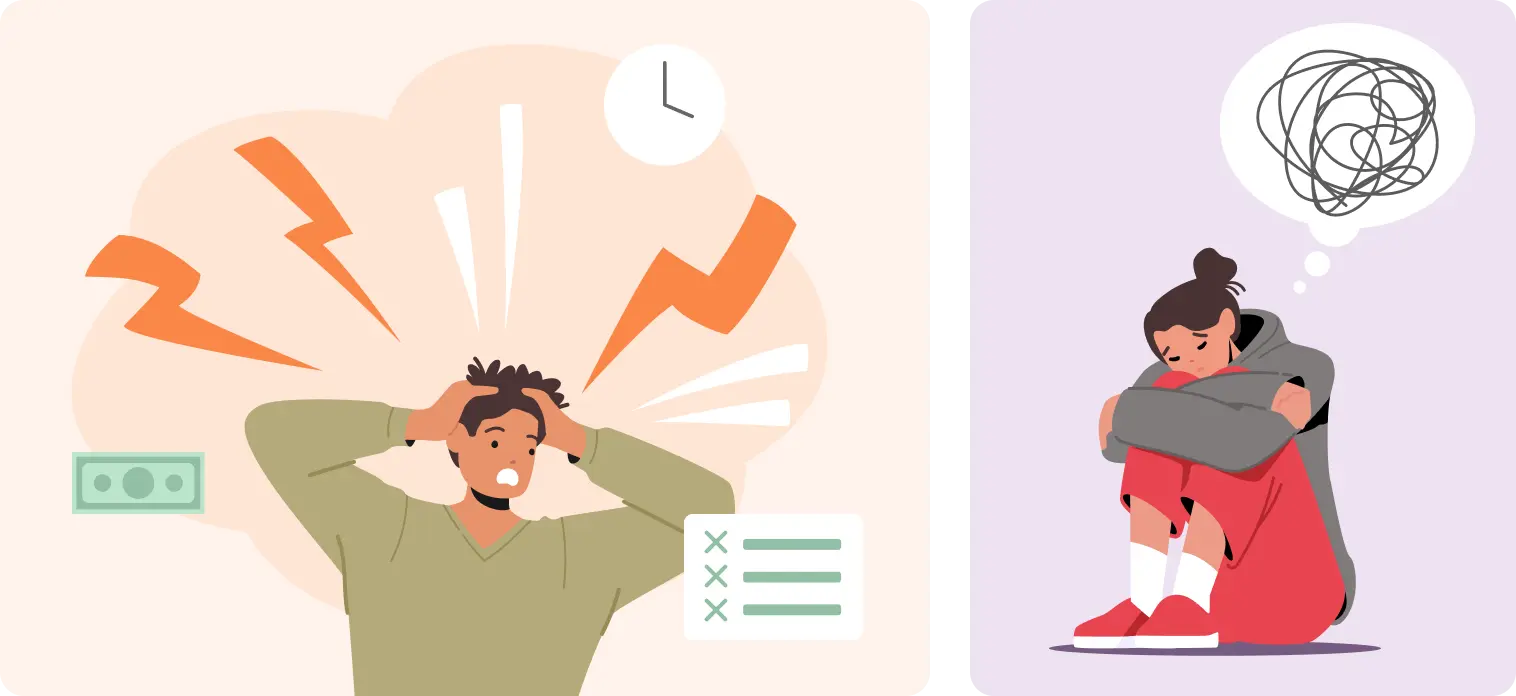Overview
Stress is your body’s natural response to demands or threats, whether they’re real or perceived. It triggers a cascade of mental and physical reactions designed to help you deal with the situation at hand—the famous “fight or flight” response. While this response can be beneficial in certain situations, prolonged or chronic stress can take a toll on your health and wellbeing. Stress that’s not dealt with can lead to many health problems, such as high blood pressure, heart disease, stroke, obesity, and diabetes.
Stress affects everyone, regardless of their background or genetic makeup. In fact, 74% of people surveyed in the UK reported feeling so stressed they were overwhelmed or unable to cope in the last year. Fortunately, there are numerous ways to help alleviate stress and improve your overall wellbeing.

Causes
The sources of stress, often referred to as stressors are as varied as the individuals experiencing them. They can stem from external factors such as work pressures, financial difficulties, or relationship conflicts. Additionally, internal stressors like perfectionism, pessimism, or unrealistic expectations can contribute to feelings of stress and overwhelm. Your genetics can also predispose you to be more sensitive to stressors.
Common stressors include:
- Work or academic pressures, poor work-life balance, unrealistic workload or expectations
- Financial difficulties
- Relationship problems
- Major life changes (e.g., moving, divorce, loss of a loved one)
- Health concerns or chronic illness
- Uncertainty about the future
- Perfectionism or high expectations
- Conflict with others
- Time constraints or deadlines
- Lack of control or feeling overwhelmed
- Traumatic experiences or past trauma
- Environmental factors (e.g., noise, overcrowding)
- Negative self-talk or low self-esteem
Symptoms
Physical symptoms may include headaches, muscle tension, fatigue, and changes in appetite or sleep patterns. On the mental and emotional front, you might experience irritability, anxiety, mood swings, difficulty concentrating, or feeling overwhelmed. Recognizing these signs is crucial for taking proactive steps to address your stress levels.
It’s also important to remember is that these symptoms are normal, natural and not dangerous. Your body has designed them to protect us and they can be helpful over the short term. Nevertheless, you should get emergency help right away if you have signs of a heart attack such as chest pain, especially in combination with shortness of breath, jaw, back, shoulder or arm pain, sweating, dizziness, or nausea.
Common symptoms include:
- Headaches
- Muscle tension or pain
- Fatigue
- Sleep problems
- Irritability or agitation
- Difficulty concentrating
- Racing thoughts
- Changes in appetite
- Change in sex drive (reduced libido)
- Digestive issues, stomach problems
- Increased heart rate or palpitations
- Increased sweat
- Feeling overwhelmed or anxious
- Mood swings, angry outbursts
- Sadness or depression
- Social withdrawal, avoiding friends, staying home
- Over or under eating
- Getting sick easier due to weak immune system
- Exercising less
- Drug or alcohol misuse
Stress Management
There are many things you can do to help you manage stress effectively. From lifestyle adjustments and relaxation techniques to professional interventions like therapy and medication.
Keep in mind that while idle activities such as watching television, going on the internet or playing video games may distract you from your stress temporarily, they are not recommended stress management techniques. They may actually make your stress levels go up over time.
Strategies to consider:
- Lifestyle habits can help bolster your resilience to stress. Get regular physical activity, eat a balanced diet, prioritize adequate sleep, and avoid consuming excessive caffeine and alcohol.
- Relaxation techniques such as deep or controlled breathing exercises, meditation, yoga, or progressive muscle relaxation can help calm both your mind and body.
- Time management can alleviate feelings of being overwhelmed and improve your sense of control. Organize your tasks and prioritize your responsibilities. Break larger tasks into smaller, manageable steps, and allocate time for relaxation and leisure activities.
- Social support is key to combatting stress related to loneliness and for providing perspective. Reach out to friends, family members, or support groups for emotional support and encouragement.
- Professional help can be extremely effective if you’ve taken steps to control your stress but you keep having symptoms. Your health care provider may use cognitive therapy to help you identify negative thinking, a technique that works very well in combination with medicines if needed.
Pharmacy Stress Aids
There are a variety of over-the-counter pharmacy products designed to provide relief from your symptoms and promote relaxation. When choosing a stress aid, it’s essential to consult with a pharmacist or healthcare professional to determine the most suitable option based on individual needs and preferences.
Common aids include:
- Herbal supplements such as valerian root, passionflower, or chamomile, have calming properties.
- Sleep aids such as such as melatonin supplements and Nytol can help you get essential sleep.
- Magnesium supplements are known to play a role in relaxation
- Travel medicines such as Vertigon not only help with vertigo, but they can also block certain stress receptors in the brain.
FAQ
Is all stress bad for me?
Not all stress is inherently harmful. In fact, short-term stress, also known as acute stress, can be beneficial in certain “fight or flight” situations. By releasing hormones like adrenaline and cortisol, stress motivates you to take action and adapt to challenges in short bursts. It’s when stress becomes chronic and overwhelming that it starts to pose significant risks to your health and wellbeing.
How can I tell if I need professional help for managing stress?
If you find that stress is significantly hindering your ability to complete daily activities, hurting your relationships, and negatively affecting your work performance, or mental health, it may be time to seek professional help from a therapist, counselor or mental health professional. Signs include feeling overwhelmed by stress, experiencing persistent anxiety or depression, coping with substance abuse, or having difficulty managing stress on your own.
What is the difference between stress and anxiety?
Stress and anxiety lead to a nearly identical set of symptoms including insomnia, difficulty concentrating, fatigue, muscle tension, rapid heart rate, and irritability. However, stress is a temporary demand placed on your brain or physical body caused by an external trigger, event or external scenario such as deadline, fight or illness. Anxiety, on the other hand, is defined by persistent, excessive worries or dread that doesn’t go away regardless of the circumstances and continues even when the stressor has ended. Anxiety may have no obvious trigger.
More Info
To get more information about stress management, visit the NHS condition page.



















